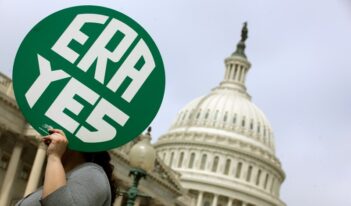
The Supreme Court’s ruling on sports betting has broad implications for anti-commandeering issues.
The recent decision from the U.S. Supreme Court in Murphy v. National Collegiate Athletic Association is a major victory for federalism.
The ruling, which struck down a federal law that blocked states from “authorizing” sports gambling under their own state laws, has important implications that go beyond the issue of sports gambling. Notably, liberal Justices Stephen Breyer and Elena Kagan joined the five conservatives in a 7-2 majority opinion holding that the federal law violated the U.S. Constitution.
Murphy struck down a provision of the federal Professional and Amateur Sports Protection Act (PASPA), which mandates that states may not “sponsor, operate, advertise, promote, license, or authorize by law or compact” sports betting. A coalition of sports leagues, including the National Collegiate Athletic Association, the National Basketball Association, the National Football League, and Major League Baseball, filed a lawsuit challenging two New Jersey state laws. The sports leagues argued New Jersey’s 2012 and 2014 laws, which partially repealed a prior prohibition on sports gambling within the state, qualified as “authorization” of sports betting and thus violated PASPA.
New Jersey, for its part, argued that that PASPA runs afoul of constitutional restrictions on federal “commandeering” of state governments. Under several longstanding Supreme Court precedents, the Tenth Amendment prevents the federal government from compelling the states to enforce federal law, including by forcing state legislatures to enact laws of their own.
An unlikely coalition of major sports leagues and the Trump Administration—which supported the leagues despite President Donald Trump’s longstanding conflict with the NFL over players who kneel during the national anthem—defended PASPA. The Court majority agreed with the sports leagues that New Jersey’s law violates PASPA, but also agreed with New Jersey that PASPA is unconstitutional.
To get around the anti-commandeering doctrine, the sports leagues and the administration claimed that a distinction exists between commandeering and blocking a state from affirmatively acting to “authorize” gambling under state law. In their view, PASPA does not qualify as commandeering because it does not prevent complete legalization of sports gambling.
The sports leagues argued that only state laws that affirmatively “authorize” gambling in some way come within the scope of PASPA. The New Jersey laws, in their eyes, qualify as authorization rather than complete legalization, because they restrict sports gambling to some types of locations and limit the range of teams on which gamblers can bet, rather than just simply eliminating all state regulation of betting.
Writing for a 7-2 majority, Justice Samuel Alito concluded that “this distinction is empty” because “in either event, state legislatures are put under the direct control of Congress.”
Justice Alito is exactly right. The distinction between “legalization” and “authorization” collapses under any serious scrutiny because virtually any law that repeals a previously banned activity, but does not completely abolish all restrictions on it, can be described as authorization.
As Justice Alito points out, neither the sports leagues nor the Trump Administration could explain exactly where legalization ends and affirmative authorization begins. A decision upholding PASPA would have largely gutted the anti-commandeering rule, because the federal government could easily get around it by adopting regulations preventing states from liberalizing any prohibition of previously forbidden behavior under the guise of regulating “authorization.” As long as a state law did not completely eliminate all legal constraints on the forbidden behavior, the federal government could preempt the state law as “authorization.”
The ruling has important implications for sports betting, which states are now largely free to permit as they see fit. Some have already begun to follow New Jersey’s example.
Because the Court majority (minus Justice Breyer, who dissented on this point) concluded that the unconstitutional ban on authorization of sports gambling cannot be “severed” from the other provisions of PASPA, the decision struck down the entire law, which now increases the potential scope for states to repeal prohibitions of sports betting. The other provisions included sections barring states from operating sports gambling facilities, forbidding the operation of sports gambling facilities by private parties “pursuant” to state law, and restricting advertising of sports gambling.
Since the decision in Murphy applies to other similar federal laws, this precedent will have implications for a wide range of issues beyond regulation of sports gambling. Besides its impact on sports betting, the most immediate effect of Murphy is that it will help “sanctuary” cities and states in their ongoing legal battles with the Trump Administration.
The sanctuary cases currently ongoing in lower federal courts involve a wide range of different issues. Although several are far removed from Murphy, some of the sanctuary cases are closely related to Murphy’s focus on federal commandeering of state and local governments. Most notably, a lawsuit brought by the U.S. Department of Justice against California and several cases brought by cities against the Trump administration, involve challenges to the constitutionality of Section 1373, a controversial federal immigration law. This statute bars states and localities from instructing their employees to withhold information from federal immigration enforcement officials about “the citizenship or immigration status, lawful or unlawful, of any individual.”
Like PASPA, Section 1373 is an attempt to circumvent the anti-commandeering rule’s strictures against federal mandates coercing states into helping to enforce federal law or enact a state law. Instead of directly ordering states to ban sports gambling, PASPA forbids states from repealing a prohibition of it in ways that “authorize” the activity under state law. But the Supreme Court saw through this subterfuge and struck down PASPA, because it violated the anti-commandeering rule by putting state legislatures “under the direct control of Congress” and issuing “direct orders to state legislatures.”
Section 1373 suffers from much the same flaw. Instead of directly ordering states and localities to divulge information to federal officials, it “merely” bars them from issuing orders to their subordinates forbidding such disclosure. But the practical effect is that states must comply with federal dictates.
Like PASPA, Section 1373 is an “order” to state and local officials; it undermines states’ control over their governmental machinery and partially transfers it to the federal government. In this case, federal law prevents states and localities from directing their law enforcement officials to pursue state and local priorities rather than assist federal immigration enforcers. As legal scholar Garrett Epps puts it, “the federal government can’t order the states to dance to its tune; according to Murphy, it can’t tell the states they may not decide not to dance to the federal tune either. No double-negative tricks now!” Murphy undercuts Section 1373 in much the same way as it doomed PASPA.
In my view, Section 1373 was unconstitutional even under pre-Murphy Supreme Court precedent. But this was an admittedly difficult issue that divided lower courts. Murphy could help resolve the division in favor of the view that Section 1373 should be invalidated. In June, a federal district court in Philadelphia cited Murphy as a justification for striking down Section 1373. More recently, another federal court reached a similar conclusion, indicating that “Section 1373 does just what Murphy proscribes.” Other courts are likely to make similar decisions in the future.
The connection between Murphy and the sanctuary cities cases also highlights the phenomenon of liberals using federalism doctrine to resist the Trump Administration, including by relying on anti-commandeering rules that most on the left decried when 1990s decisions supported primarily by conservative Supreme Court Justices adopted them. Historically, the left has been very suspicious of judicial enforcement of structural limits on federal power. It is possible that that has now begun to change.
Both sides of the political spectrum are often guilty of “fair weather federalism” – alternately supporting and opposing judicial enforcement of limits on federal power whenever it is politically convenient. The sanctuary cities litigation is, in part, yet another manifestation of this trend. But in recent years, prominent left-of-center legal scholars such as Heather Gerken and Jeffrey Rosen have begun to argue that liberals should reconsider their stance on federalism more generally.
The Trump Administration highlights serious limitations of the traditional liberal view that federal power is the friend of minorities, while states and localities are their enemies—an assumption at the heart of much progressive suspicion of federalism. Both left and right have much to gain from strengthening constitutional limits on Washington, D.C. at a time when our society is both highly diverse and deeply polarized.
Whether Murphy and its aftermath help shift traditional assumptions about federalism remains to be seen. For now, all that can be safely said is that it is an important victory for sports gamblers, sanctuary cities, and the anti-commandeering doctrine.
This essay is part of a series, entitled The Supreme Court’s 2017–2018 Regulatory Term.
Parts of this article are adapted from blog posts previously published at the Volokh Conspiracy blog, hosted at the Reason magazine website.




